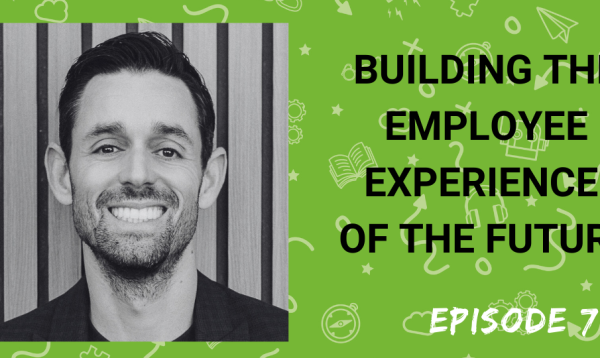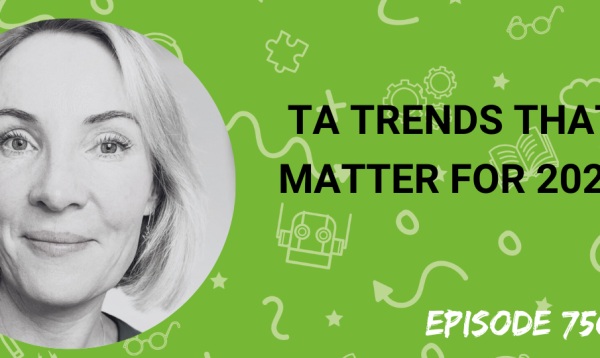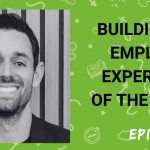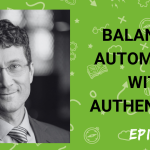We live in interesting times. Technology is evolving constantly around us and unsurprisingly everyone’s attention is often focused on what will be the next disruptive game changer for the recruitment industry. What we don’t pay enough attention to though is the experiences and frustrations of candidates who have to try and stand out in a noisy world using the tools that are completely outmoded in other aspects of life but jealously held onto by the recruitment industry.
A shiny new CRM or a brilliant assessment algorithm may make recruiters’ lives easier but they don’t really make the experience of recruitment very different for the candidate when everything still hangs round them having to use a word document CV or static LinkedIn profile to get the recruiter’s attention in the first place.
The situation is untenable in the long term and it shouldn’t come as a shock that eventually the jobseekers were going to take things into their own hands.
My guest on this week’s episode is Esther Crawford creator of a “Resumebot” which took her from frustrated jobseeker to funded entrepreneur. I want you to imagine a world where artificially intelligent chatbots match candidates and recruiters in a completely authentic and bespoke way. In the interview you will hear Esther’s story and find out how she might have taken us on the first step of the journey to a new way of recruiting
This week’s podcast is kindly supported by Lever, where ATS meets CRM
Subscribe to this podcast in iTunes
Transcript:
Matt Alder [00:00:00]:
Support for this podcast comes from Lever. Providing a modern take on the applicant tracking system, Lever combines ATS and CRM functionality into a single, powerful platform to help you source, nurture, and manage your candidates all in one place. What’s more, Lever’s deceptively simple interface means that hiring managers and applicants love it too. To find out how Lever can help you both accelerate and humanize hiring, visit www.lever.co recruit. That’s www.lever.co recruit. And Lever is spelt L E V E R Lever. Where ATS meets CRM.
Matt Alder [00:01:07]:
Hi everyone, this is Matt Alder. Welcome to episode 59 of the Recruiting Future podcast. In the quest to find the next disruptive thing in recruitment, we often overlook the fact that candidates are still having to make do with frustratingly basic tools to promote themselves to recruiters. Although on the surface it might seem surprising, it’s actually inevitable that one of the most interesting innovations I’ve seen in recruitment for some time has actually come from a frustrated job seeker. My guest this week is Esther Crawford, who went from frustrated job seeker to funded entrepreneur via her invention of the resume bot. I want you to imagine a world where artificially intelligent chatbots match candidates and recruiters in a completely authentic and bespoke way. Now keep listening to hear Esther’s story and find out how she might have taken us on the first step of this journey to a new way of recruiting. Hi Esther, and welcome to the podcast.
Esther Crawford [00:02:17]:
Thanks for having me.
Matt Alder [00:02:19]:
My pleasure. Could you just introduce yourself to everyone and tell us what you do?
Esther Crawford [00:02:24]:
Sure. My name is Esther Crawford. I’m based in San Francisco. I’ve spent the last nine years as a product marketer. The last five years I’ve worked in technology startups, helping to launch companies, mostly in the mobile app space. I a couple of months ago launched a resume bot that then took my whole career path in a different direction. And as of a week ago, I have actually started my own company called Olabot. So that’s what I’m up to these days. And I just got funded, so I’m taking a seed investment from Beta Works, which is a tech incubator out in New York City. And I’m really excited to be launching a bot related company.
Matt Alder [00:03:18]:
Fantastic. And first of all, congratulations on the career change and the investment. That’s amazing. So I sort of picked up your story in one of the tech blogs, but could you just Sort of talk everyone through, you know, what happened and what a resume bot is and how that. How the story panned out.
Esther Crawford [00:03:41]:
So the startup that I was working for, we were struggling to raise another round of funding. And the CEO was really honest with us. Our team wasn’t that big. We knew what was going on, and we had some extra time essentially to work on side projects while we figured out if the company was going to be acquired or not. And so I was looking at different side projects that I’ve been thinking about working on. And I’d been paying a lot of attention to the messaging space. You think about the rise of messaging apps and how for the first time now, messaging apps have actually eclipsed social networks in terms of daily active usage. So apps like Facebook Messenger, WhatsApp, Telegram line, WeChat, these messaging apps have become the place where people spend the bulk of their time and where they exchange the bulk of their communications with friends, family, family members, colleagues, all of that. And so I was noticing this, and I was really early on the social web, really early on Twitter, YouTube, etc. Was an early blogger. And I started to feel like this was not just a trend, but a real shift in how people were communicating. And so here, the company that I’m part of is on a downward trajectory, and I’m thinking about, well, what am I going to do next? I have a LinkedIn profile and I thought, well, I should probably go update my LinkedIn. I should start, you know, pinging friends privately and letting people know that I maybe come available pretty soon to be finding a job again. So I go to my LinkedIn and I realize, like, gosh, this is not really the story that I want to be telling to people. This is boring. It’s static. It’s. It doesn’t really give a sense for who I am as a person. These are just basically keywords that recruiters can use to search and make recommendations and connections between me and an employer. But there’s so much more that can go into telling my story. And in making a really great culture fit with the right company, finding a job by itself is not that difficult. For me at least, there are a lot of really interesting jobs here in Silicon Valley. But it’s about finding the right job, the right company. And I felt like what LinkedIn offered was not enough. So I started to play around with some ideas, like, how could I better tell my story? There are a lot of WordPress websites out there that you can create or about me. Pages that you can create that tell a little bit More. Maybe there’s a bigger photo. Maybe you can add some side project information, some portfolio, A portfolio portfolio of some of your work. But again, they all felt pretty boring and static. And so I decided to just try something really different and build a resume bot to see if that would be a more interesting and compelling way to tell my personal story.
Matt Alder [00:07:07]:
Okay, so tell us exactly what a resume bot is.
Esther Crawford [00:07:12]:
A resume bot is essentially just a way to let someone interact with you through a series of automated messages. It’s kind of like a decision tree. But what you can do is add in things like API data. So an API is just a way of connecting into a data source in another service. So that might be stuff about you that you’ve shared on Facebook or stuff that you’ve shared on Instagram or Twitter or LinkedIn or Dribbble if you’re a designer, GitHub if you’re a developer. Most of us are putting information out into various services, but there’s no way to then tie those all together and package it nicely so that any particular recruiter could actually access it and then make interesting connections. And so a resume bot seeks to solve that problem. It’s a way to be able to tell your personal story, also show your creativity, demonstrate some things about your work background, your history, show samples of your work potentially. And then ultimately, one of the things that’s really interesting to me and particularly compelling is bots that sit on top of messaging platforms enable one to one communication once the recruiter is ready. So a recruiter may find out more information about you and then they’re like, oh, hey, I just want to have a quick chat or have a quick follow up question to know something more about your background or why did you specifically study this? If your bot doesn’t explain that well, or they’re excited because your bot actually does signal that there’s something really interesting and compelling about this particular fit. That recruiter could actually just ping you directly, set up a time to chat, and without a lot of effort, you’re able to have kind of like a pre screen screen training call over Messenger. So that’s essentially what a resume bot is.
Matt Alder [00:09:14]:
Okay, so to clarify, the recruiter is basically talking to an automated version of you, and that automated version of you is pulling your data via APIs from LinkedIn, Facebook and other places where that might hold the kind of information a recruiter would want to know. Is that right?
Esther Crawford [00:09:37]:
Yep, that’s perfect.
Matt Alder [00:09:39]:
So how, and maybe your story is the sort of perfect example of this. How do you attract the Attention of recruiters to start to engage with your, you know, with your bot.
Esther Crawford [00:09:55]:
So I placed my bot in two places in addition to writing about the bot. So the two places that I put it was in my summary on LinkedIn. And I used a service here in Silicon Valley called Hired. Hired does a great job of connecting prospective employees with job opportunities. And so they have a summary section as well. And I place my bot in both places. And what really surprised me was within 48 hours of my hired profile going live, I had five interview requests. And four of those interview requests cited things they could have only known from engaging with my bot. And then later, as I followed up and had interviews with those companies, the recruiters had gone through and engaged my bot. And they found the additional information in there was really interesting and engaging. And what was really fascinating for me was they felt like they had a sense of my personality and that they knew that I would be a better culture fit than they would have otherwise known just by reading a static one pager about me.
Matt Alder [00:11:11]:
And were they sort of asking free text questions or was the bot giving them options about what it could ask about you? How does the interface work?
Esther Crawford [00:11:23]:
Yeah, so the interface at the time was pretty, pretty simple. You could essentially follow a series of questions the bot would ask you what you’re looking for. Are you wanting to dig into my education? Are you wanting to dig into my work history? Are you wanting to dig into me as a person? And then in all of those different areas, you could follow different threads and find out like, well, why did I study and get my master’s in international relations? But how did I end up in a career in technology? Like, those things don’t seem connected. And if you looked at my LinkedIn profile, there’s. There is no real way to connect that, but there’s a whole story that’s actually pretty compelling. And the recruiters were able to learn that story and, and get a sense for why I’m an interesting candidate for them.
Matt Alder [00:12:18]:
And in terms of them learning about that story, was it, was it pulling data from other sources? Was it something, was it a kind of a script that you pre populated? Where is the data coming from that sort of pulled those things together?
Esther Crawford [00:12:36]:
Yeah. So in the original version of Esther Bot, it was just a script. It was me sharing some facts about how I transitioned from what I had studied, why I had studied it, and then talking through essentially my resume. So very similar to what would I be sharing in the first 10 minutes of an interview when someone sits down and says, hey, tell me about yourself and how you got here. I just sort of wrote that out in a bot framework and let people walk through that process and sort of it’s a choose your own adventure. So you could hop around and you could start talking to my bot about my education, but then jump over into a little bit about my childhood and then jump over to a little bit more about my specific work experience. It was a scripted experience and since then the bot has evolved. I just launched another bot for someone named Chris Messina just earlier this week. His bot, the Messina bot is what I’ve been calling it, is a much more structured approach and it pulls in API data. So everything from his personal preferences around food and drinks to his work history at Uber and Google and interesting projects he’s worked on. Also all the articles that he’s written, publications that have written about him. We’re using Medium’s API to pull in his blog. Yeah, it’s, it’s been really interesting to see people engage with it. And he also, he’s actually not even looking for a job and he’s had recruiters contact him saying, hey, now that I know all these interesting things about you, I have a great opportunity I want to tell you about.
Matt Alder [00:14:38]:
Oh, that’s brilliant. Absolutely brilliant. I’ve got a couple more questions about where you see this fits in recruitment, but before I ask that, I’m just really interested to hear the rest of your story. You were, you were kind of approached. How did you get from being approached by recruiters to having your own funded startup?
Esther Crawford [00:15:01]:
Yeah, it was definitely not the, it was definitely not what I expected to happen. I launched off Esther bot with a pretty pure intention. I knew that I wanted to be looking, making myself available to finding job opportunities. And the last time that I had looked for work, I found it to be a really cumbersome, slow moving process. I was frustrated and I felt like, why am I not getting in front of these great companies? Why is this process so obscure and opaque to me? And what I found was that basically I needed introductions to the right companies that I was interested in. And I felt like, well, can I make my own introduction by this bot? Can I introduce myself and not have to know someone at the company in order to be considered for an interview? And so yeah, I launched the bot, I wrote an article, a couple of articles actually about it. And then, you know, I’m a marketer. So I went to the press and said, hey, here’s an interesting, compelling story, let’s talk about this. And so I got some really great Press in Lifehacker and Fast Co. And VentureBeat. And so, you know, that was really also a way of showing my skills instead of just talking about them. It’s like, here I’m in marketing, let me actually market this product that I’ve created. And so I also put it on my LinkedIn and on my hired. And I went out and started applying for jobs and was flooded with interview requests and actually went out and interviewed and got a couple of really amazing offers from big and small companies. And at the same time I had heard about Bot Camp, which is a program through Beta Works. Beta Works is a really well respected fund slash accelerator where they take early stage ideas and startups and give you, in this case, $200,000 to go and build a product and launch it. And so I had heard about this new fund, Bot Camp and I decided to apply for it because I felt like I had really not just built something interesting, but I could feel the demand for other people who wanted to be able to create their own as well. And it just really excited me the idea of being able to help other people make their own recruitment process easier and smoother. And I saw just this opportunity for personal resume bots. And so I pitched myself to them and went through their, through their process and ultimately they selected me along with nine other companies and starting, yeah, last like my, let’s see, I got the news two weeks ago and I was sitting on an offer that I was about to take. It was a great offer. I was really excited about the company and then I was presented with the opportunity to get funded and had to make like a tough choice, but ultimately felt like, all right, I’m going to launch, launch out on my own and build this company in order to help other people successfully navigate the, this whole process of building a bot for themselves.
Matt Alder [00:18:45]:
That’s amazing. That’s, that’s absolutely brilliant. That, that’s, that’s, that’s happened for you. Just, just sort of final question. You know, where do you see this going in the future? Because I mean, I can, I can, I’m imagining a world where recruiters have their own bots that are talking to resume bots. The who becomes some kind of, you know, strange artificial intelligence driven thing. I mean, what’s your, what’s your vision? Where, where do you think, where do you think this might go?
Esther Crawford [00:19:15]:
I think you’re absolutely right. I think that what we’ll probably start with is individuals having their own bots. Then we’ll see brands and companies and then teams inside of companies having their own bots. Because I mean, if you think about it, a company that’s big, like say Google, to join a company like that, you don’t really know what you’re getting into until you get down to the team level. And that’s what really matters. Are you a good fit for that particular team? I think yeah, we’ll see bots for companies as well as bots for teams, bots for individuals. And ultimately it’s true that those bots can actually interact with each other in order to help make those initial filters and then do the sort of like, you know, connective piece where a recruiter can get to a certain point and then say, okay, now I’m actually interested in engaging in a one to one conversation with this person. And that could actually start over a platform like messenger or over a platform like LinkedIn’s in app mail if they ever open that messaging API or maybe over imessage when that gets opened. Right. So these are really early days, but it feels like an inevitability. Almost like, it feels like, almost like it was an inevitability for you didn’t need to have a profile on a site like LinkedIn. So, yeah, I think the future is going to include a lot of bots and a lot of artificial intelligence to help make those initial connections and sift through all of the data that is uploaded into your bot so that when that data gets parsed, you’re able to do a better job of matching not just on the keywords, but really the insight and sentiment and analysis around who you really are and what you really bring to the table and what that company and team can actually offer you so that the best matches can be made. And I think that’s the really exciting part about the future of recruitment and how technology is going to really change the game.
Matt Alder [00:21:42]:
Absolutely. I mean, I think it’s a very exciting future and congratulations for helping to start the revolution. So, yeah, you know, best of luck with it all and thank you very much for talking to me.
Esther Crawford [00:21:56]:
Thanks for having me.
Matt Alder [00:21:58]:
My thanks to Esther Crawford. You can subscribe to this podcast on itunes or via your podcasting app of choice. Just search for recruiting future. You can find all the past episodes@www.rfpodcast.com on that site. You can also subscribe to the mailing list and find out more about working with me. Thanks very much for listening. I’ll be back next week and I hope you’ll join me.









